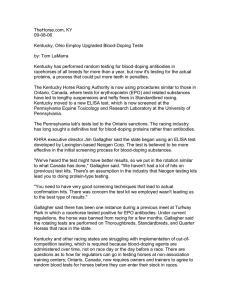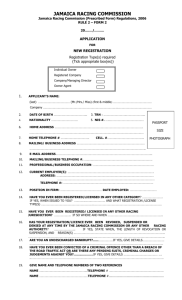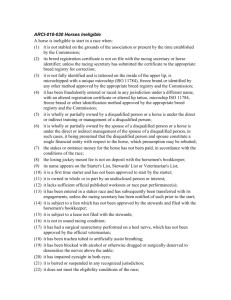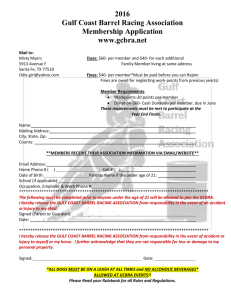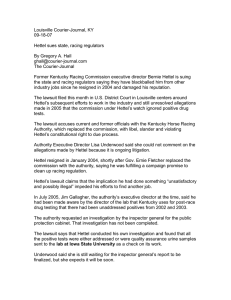Louisville Courier-Journal, KY 12-11-07
advertisement
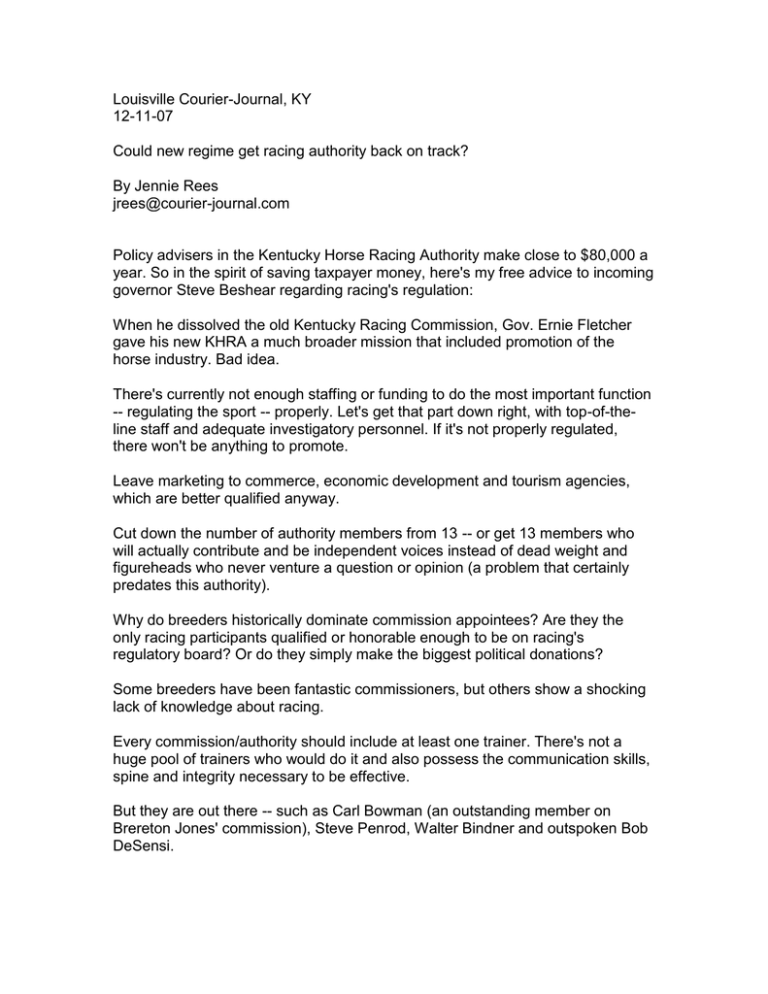
Louisville Courier-Journal, KY 12-11-07 Could new regime get racing authority back on track? By Jennie Rees jrees@courier-journal.com Policy advisers in the Kentucky Horse Racing Authority make close to $80,000 a year. So in the spirit of saving taxpayer money, here's my free advice to incoming governor Steve Beshear regarding racing's regulation: When he dissolved the old Kentucky Racing Commission, Gov. Ernie Fletcher gave his new KHRA a much broader mission that included promotion of the horse industry. Bad idea. There's currently not enough staffing or funding to do the most important function -- regulating the sport -- properly. Let's get that part down right, with top-of-theline staff and adequate investigatory personnel. If it's not properly regulated, there won't be anything to promote. Leave marketing to commerce, economic development and tourism agencies, which are better qualified anyway. Cut down the number of authority members from 13 -- or get 13 members who will actually contribute and be independent voices instead of dead weight and figureheads who never venture a question or opinion (a problem that certainly predates this authority). Why do breeders historically dominate commission appointees? Are they the only racing participants qualified or honorable enough to be on racing's regulatory board? Or do they simply make the biggest political donations? Some breeders have been fantastic commissioners, but others show a shocking lack of knowledge about racing. Every commission/authority should include at least one trainer. There's not a huge pool of trainers who would do it and also possess the communication skills, spine and integrity necessary to be effective. But they are out there -- such as Carl Bowman (an outstanding member on Brereton Jones' commission), Steve Penrod, Walter Bindner and outspoken Bob DeSensi. Likewise, the authority should include someone with a strong background as a veterinarian with a racetrack practice, not a farm vet. I disagree with those who say commission members should have no ties to the industry. Racing is too complex and fast-changing. Get fair, qualified and independent-minded individuals and acknowledge their conflicts up front. Otherwise, the ones who don't know anything become sheep for the dominant personalities, and real debate doesn't happen. The commission executive director should be a merit-system employee, not a political appointee. Under the current system, even the most professional executive director can get caught up in politics. One problem with the current authority is that no one with power had previous experience either in his or her present capacity or in a related position. No matter how well-intended they might be, executive director Lisa Underwood, chief state steward John Veitch and chief state veterinarian Lafe Nichols are rookies in their jobs; KHRA chairman Bill Street and vice chair Connie Whitfield came in with virtually no knowledge of racing. The experience vacuum might explain the too-long delays between rule violations and meting out penalties. By the way: Are the authorities ever going to address suspended trainer Patrick Biancone's failure to disclose previous rulings against him on his 2006 license application, or will they just let it slide? Those who have been punished for not being completely truthful about past rules and law violations on the Kentucky applications surely don't think Biancone's transgression was trivial. Remember Derby-winning jockey Stewart Elliott being fined $1,000 for failing to disclose assault and criminal mischief charges on his application? The commission should hire a qualified director of racing operations to circulate at the tracks and training centers to make sure everyone is doing his or her job and rules are being enforced -- including stewards, racing departments, state veterinarians and security personnel. A couple of fiascos this year -- disappearing post-race blood samples at Churchill and a horse wrongly scratched at Ellis for a non-existent medication violation -might not have been prevented, but at least there would be more accountability. Mistakes do happen. But when they're done by an official, they too often are brushed under the rug with no recourse. Why are Kentucky tracks paying Iowa State University for their drug testing? The commonwealth should have its own state-of-the-art testing lab at University of Kentucky. Get someone to head it who is on the cutting edge of testing, has a squeakyclean reputation and has the background and open mind to do detective work to get to the root of an unusual finding -- something unfortunately lacking in the cases this spring involving the too-high-to-be-true Lasix overages. A structural makeover in which all three stewards are state employees, not two paid by the track. Kentucky is an important enough circuit that it should have fulltime, state-employed officials. The industry certainly pays more than enough in taxes that its regulation shouldn't be done on the cheap.


